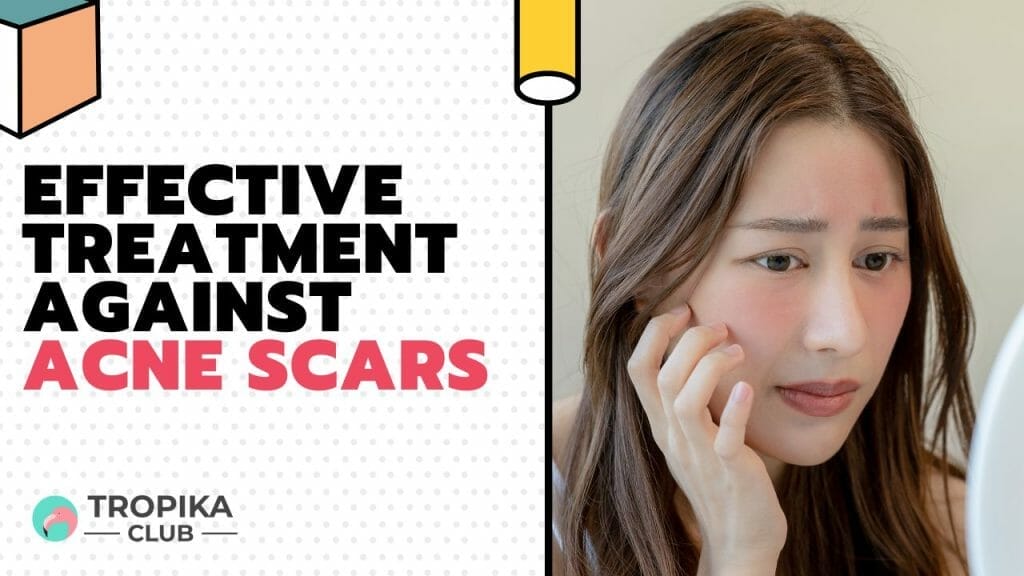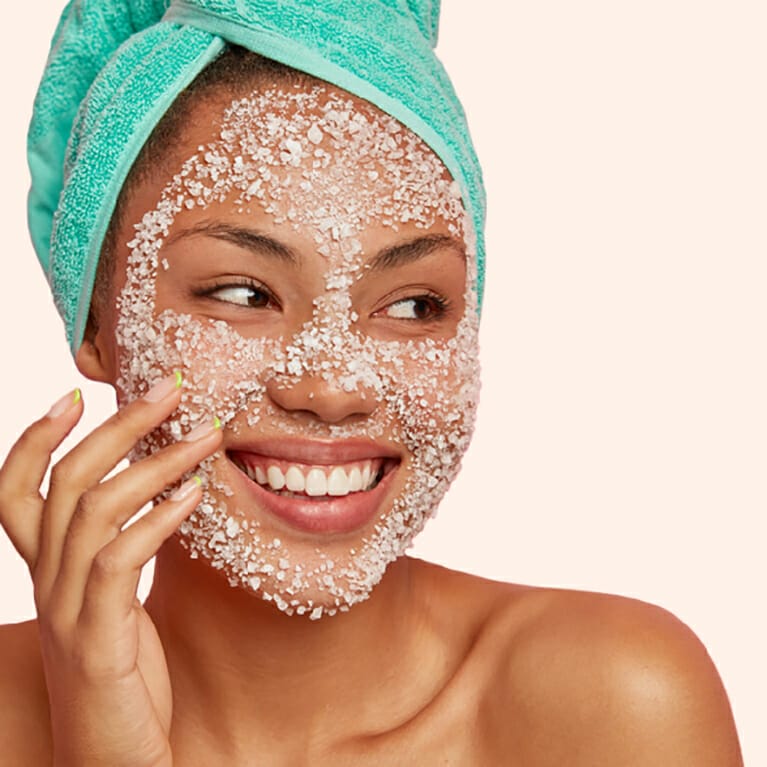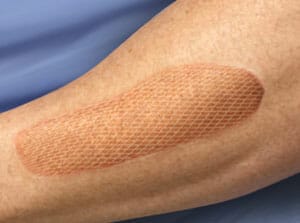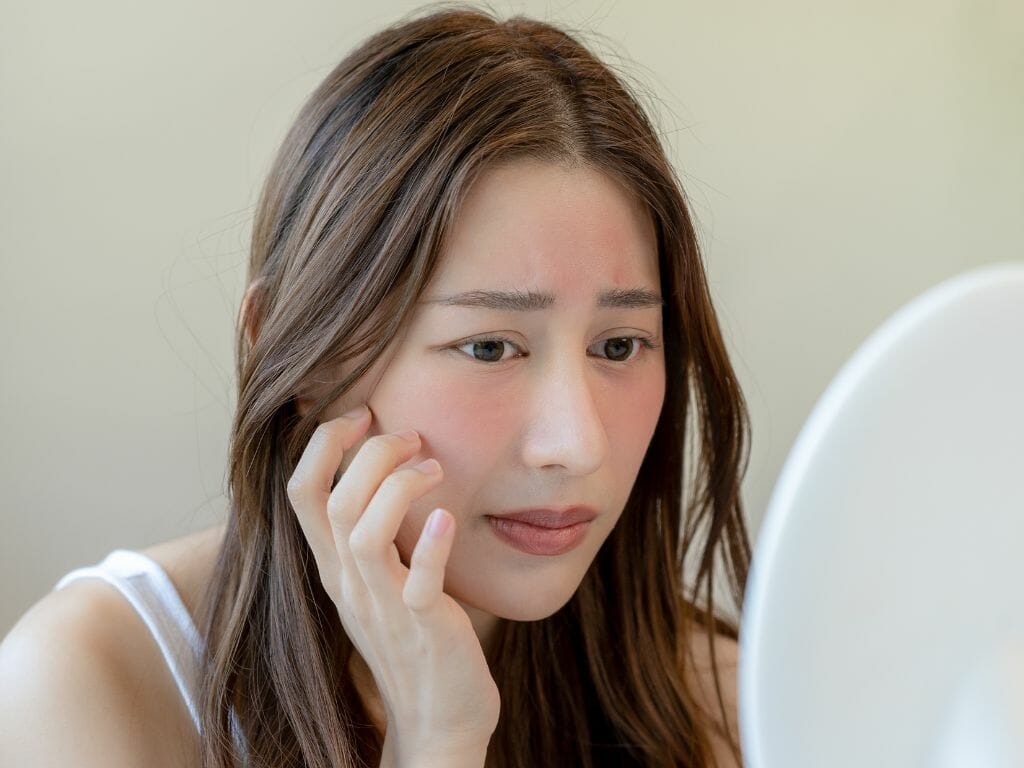Effective treatment against Acne Scars – Your total guide
“Tsk! Why wouldn’t it go away regardless of what I did? It’s driving me nuts.”- exclaimed C, (whom she liked to be named), with a face full of worries. This issue has been bugging her for years- visible acne scars, red spots, and angry acne developing on her: the frustrating woes of teenage or adult acne, as some may call it. Today, The Tropika Club will be offering you #tips101 on the effective treatment against acne scars.

Table of Contents
- No Time to Read? Here’s a Snappy Summary of This Article
- Introduction
- YOU asked: WHY IS THIS HAPPENING TO ME?
- YOU asked: ANY PREVENTION METHODS?
- YOU asked: MY ACNE SCARS DOESN’T GO AWAY. WHAT ARE THE TREATMENTS AVAILABLE?
- MICRONEEDLING
- EXFOLIATION
- DERMAL GRAFTING
- Conclusion: How to choose the best treatment for your acne scars
- Meanwhile, Check Out Tropika Club’s Ecosystem of Websites
No Time to Read? Here’s a Snappy Summary of This Article
- Introduction: The article explains the different types of acne scars and how they form on the skin. It also provides some tips on how to prevent and treat them effectively.
- Why is this happening to me?: The article describes the causes of acne scars, such as clogged pores, deep infections, and inflammation. It also distinguishes between true scars and dark marks or hyperpigmentation, which are changes in skin color that fade over time.
- Any prevention methods?: The article suggests some ways to prevent acne scars from forming, such as keeping the skin clean, avoiding picking or popping pimples, using sunscreen, and seeking medical help for severe acne.
- My acne scars don’t go away. What are the treatments available?: The article reviews some of the treatments for acne scars, such as microneedling, exfoliation, dermal grafting, chemical peels, laser resurfacing, and fillers. It also advises to consult a dermatologist before choosing a treatment.
Introduction
Let’s start off with identifying the different common types of acne scars.
- Ice-pick scars: Deep dot-like scars that are pitted.
- Rolling scars: Wavy in appearance, similar to a bumpy road, usually with sloping edges.
- Boxcar scars: Similar to rolling scars, but with more obvious, defined edges.
- Hypertrophic scars: Scars that protrude from the skin.
The icepick scar is the most common type of acne scar. Ice pick scars appear after the formation of an infected cyst, which destroys the skin tissue – leaving behind a long narrow scar. It starts off as a mild form of acne called a comedone, formed when oil from the sebaceous glands mixes with dirt or skin cells in hair follicles, blocking it.
YOU asked: WHY IS THIS HAPPENING TO ME?
“When acne forms on your skin, your body’s natural healing processes kick in just like they would for an injury or illness. Acne forms when your skin pores get clogged with too much oil and dead skin cells. Sometimes, it appears close to the surface of the skin – which means it will probably heal after a short time with minimal scarring. When acne is rooted farther down in the skin, though, it takes longer to heal. Because this runs deeper and destroys more of your skin tissue, it often leaves scars.
Those dark marks you sometimes get after a bad outbreak are a different type of scar. Technically, they’re not scars at all, just changes in pigmentation (a technical term for skin color). Often, the skin that closes over the wound changes color, texture, or tone. In other cases, the broken blood vessels from a popped lesion leave a mark on your skin. These are what we usually call “dark marks” or hyperpigmentation.
Even if you don’t pop your acne, you may still see dark red or brown marks appear on your skin, especially deep or inflamed cases. Don’t panic, though: if you held back from popping that pimple, these marks would usually fade within a few months.”

YOU asked: ANY PREVENTION METHODS?
According to VeryWellHealth, here are some ways in which you can prevent acne scars from forming.
Treat acne as soon as it develops – The best thing you can do is get skin inflammation leveled out as quickly as time permits. Start treating it immediately, and see your primary care physician promptly if your skin inflammation isn’t showing signs of improvement with over-the-counter skin inflammation medications.
Reduce inflammation – Your goal should always be to calm inflammation and avoid doing anything that will further irritate your skin. Aggressive scrubbing and harsh skincare products should be avoided.
Don’t squeeze, pop or pick at pimples – In your attempt to pop a pimple that’s not ready to be opened, you risk exposing the inner layers of your skin to bacteria and other irritants. This can make it take longer for your pimple to heal, resulting in other pimples and even permanent scarring on your face.
Always keep your face clean -Your skin has tiny holes called pores that can become blocked by oil, bacteria, dead skin cells, and dirt. When this occurs, you may develop a pimple or “zit.” If your skin is repeatedly affected by this condition, you may have acne.
_
Read Also:
The Best Ways to Eliminate Blackheads [Gent’s Edition]_
The Tropika Club highly recommends practicing these self-care activities at home to prevent pimples and clear up your acne.
- Cleansing your face twice a day to remove excess oil and dirt.
- Using make-up that’s water-based or products that are noncomedogenic (otherwise, not pore-clogging).
- DO NOT squeeze pimples- again; we would like to emphasize the importance of this as it allows the spread of bacteria and excess oil
- As much as possible, do not touch your face.
- Stress could cause inflammation too! Take it slow if you could.
- It’s always good to wash your hands frequently, especially before applying your daily skincare regime.
- Know your skin well- consult a specialist on what works well for your skin. Buy the products that suit your skin- as long as it doesn’t aggravate the skin.
- Trust us; stress does take a toll on the skin. Take it slow if need be!

YOU asked: MY ACNE SCARS DOESN’T GO AWAY. WHAT ARE THE TREATMENTS AVAILABLE?
Acne scars can be a persistent and difficult problem to treat, but there are many effective treatments available. The Tropika Club recommends the following acne scar treatments in Singapore:
- Laser resurfacing: This treatment uses a laser to remove the top layer of skin and stimulate the production of new collagen. It is a popular treatment for all types of acne scars, including pitted scars, rolling scars, and ice pick scars.
- Chemical peels: Chemical peels use acids to remove the top layer of skin and improve the appearance of acne scars. They are less invasive than laser resurfacing, but they may not be as effective for deep scars.
- Microneedling: Microneedling uses tiny needles to create micro-channels in the skin. This allows topical products to penetrate deeper into the skin and helps to stimulate collagen production. Microneedling is a good option for people with mild to moderate acne scars.
- Dermal fillers: Dermal fillers can be used to fill in deep acne scars. They are a temporary solution, but they can provide immediate results.
- Surgical scar revision: In some cases, surgical scar revision may be necessary to remove deep or severe acne scars. This is a more invasive procedure, but it can provide the most dramatic results.
MICRONEEDLING
Microneedling is a safe, minimally invasive, and effective aesthetic treatment for acne scars that is becoming increasingly popular in Singapore. It is a procedure that involves using a device with tiny needles to create controlled wounds in the skin. This stimulates the production of collagen and elastin, which can help to improve the appearance of acne scars. Microneedling is also effective for treating other skin conditions such as wrinkles, stretch marks, and sun damage.
Here are some of the benefits of microneedling for acne scars:
- It is a safe and effective treatment that is less likely to cause side effects than other treatments such as laser resurfacing or chemical peels.
- It can be used to treat a variety of acne scar types, including rolling, boxcar, and ice pick scars.
- It can help to improve the overall texture and appearance of the skin.
- It is a relatively quick and easy procedure that can be done in a doctor’s office or clinic.
- There is minimal downtime after microneedling, so you can return to your normal activities soon after the procedure.
EXFOLIATION
Chemical peels are a popular non-surgical treatment for acne scars in Singapore. They work by exfoliating the top layer of skin, which can help to reduce the appearance of scars. Chemical peels can also stimulate the production of collagen, which can help to improve the overall texture and appearance of the skin. There are different types of chemical peels, each with its own strengths and weaknesses. For acne scars, a medium-depth peel is often recommended. This type of peel can penetrate deep enough into the skin to effectively treat scars, but it is not so strong that it causes significant downtime. If you are considering a chemical peel for acne scars, it is important to see a qualified dermatologist or aesthetician. They can help you to choose the right type of peel for your skin and ensure that the procedure is performed safely and effectively.

DERMAL GRAFTING

Dermal grafting is a minimally invasive procedure that can be used to treat acne scars and level depressed spots on the skin. It is a form of skin grafting that uses your own natural skin tissues to fill in the depressed areas of the skin, resulting in a smoother, more even skin texture.
Dermal grafting is a safe and effective procedure that can be performed in an outpatient setting. The procedure typically takes about an hour, and most patients are able to go home the same day. There is some downtime associated with dermal grafting, but most patients are able to return to work and social activities within a few days.
Dermal grafting is a good option for people who have mild to moderate acne scars. It is also a good option for people who have tried other treatments for acne scars, such as laser therapy or chemical peels, and have not been satisfied with the results.
If you are considering dermal grafting for acne scars, it is important to talk to a qualified dermatologist. They can assess your scars and determine if dermal grafting is the right treatment for you.
Conclusion: How to choose the best treatment for your acne scars
Acne scars can be a source of distress and low self-esteem for many people. But you don’t have to live with them forever. There are many effective treatments available that can help you reduce the appearance of your acne scars and improve your skin texture and tone.
However, not all treatments are suitable for everyone. The best treatment for your acne scars depends on several factors, such as:
The type and severity of your acne scars- Your skin type and color
- Your budget and preferences
- Your expectations and goals
To choose the best treatment for your acne scars, you should consult a dermatologist who can assess your skin condition and recommend the most appropriate option for you. A dermatologist can also advise you on how to prevent new acne scars from forming and how to take care of your skin after the treatment.
Some of the most common treatments for acne scars are:
- Microneedling: This involves creating tiny punctures in the skin with fine needles to stimulate collagen production and repair the scar tissue.
- Chemical peels: This involves applying a chemical solution to the skin to remove the top layer of dead skin cells and reveal smoother and brighter skin underneath.
- Laser resurfacing: This involves using a laser beam to vaporize the damaged skin cells and stimulate new skin growth.
- Dermal fillers: This involves injecting a gel-like substance under the skin to fill in the depressed areas and smooth out the surface of the skin.
- Subcision: This involves cutting the fibrous bands that tether the scar tissue to the underlying tissue and releasing the tension on the skin.
- Punch techniques: This involves removing a small piece of scar tissue with a punch tool and either replacing it with a graft of healthy skin or elevating it to match the surrounding skin level.
Each treatment has its own advantages and disadvantages, as well as potential risks and side effects. Some treatments may require multiple sessions, while others may offer more lasting results. Some treatments may be more suitable for certain types of scars, while others may work better for different skin tones. Some treatments may be more affordable, while others may be more expensive.
The key is to find a treatment that works well for you and your specific needs. You should also follow your dermatologist’s instructions on how to prepare for and recover from the treatment, as well as how to maintain your results with proper skincare.
Remember, acne scars are not a reflection of who you are or what you are worth. They are just a reminder of what you have overcome. With the right treatment, you can achieve smoother and clearer skin that boosts your confidence and happiness.
We hope this guide has helped you learn more about the effective treatments for acne scars. If you have any questions or comments, feel free to leave them below. And don’t forget to check out our other articles in Tropika Club Magazine for more tips and tricks on beauty, wellness, and lifestyle. Thank you for reading!

Frequently Asked Questions (FAQ)
Q: How can I prevent acne scars from forming?
A: The best way to prevent acne scars is to treat acne early and effectively. You should keep your skin clean and moisturized, avoid picking or popping pimples, use sunscreen daily, and seek medical help for severe or persistent acne. You should also follow a healthy lifestyle that includes a balanced diet, adequate hydration, regular exercise, and stress management.
Q: How long does it take for acne scars to fade?
A: The duration of acne scar fading depends on several factors, such as the type and severity of the scar, the skin type and color, the treatment used, and the individual’s healing ability. Generally, it can take anywhere from a few months to several years for acne scars to fade naturally. Some treatments can speed up the process by stimulating collagen production and skin renewal.
Q: What are the best treatments for acne scars in Singapore?
A: There is no one-size-fits-all treatment for acne scars, as different types of scars may require different approaches. Some of the most common and effective treatments for acne scars in Singapore are:
- Microneedling: This involves creating tiny punctures in the skin with fine needles to stimulate collagen production and repair the scar tissue.
- Chemical peels: This involves applying a chemical solution to the skin to remove the top layer of dead skin cells and reveal smoother and brighter skin underneath.
- Laser resurfacing: This involves using a laser beam to vaporize the damaged skin cells and stimulate new skin growth.
- Dermal fillers: This involves injecting a gel-like substance under the skin to fill in the depressed areas and smooth out the surface of the skin.
- Subcision: This involves cutting the fibrous bands that tether the scar tissue to the underlying tissue and releasing the tension on the skin.
- Punch techniques: This involves removing a small piece of scar tissue with a punch tool and either replacing it with a graft of healthy skin or elevating it to match the surrounding skin level.
You should consult a dermatologist who can assess your skin condition and recommend the most suitable treatment for you. You should also follow your dermatologist’s instructions on how to prepare for and recover from the treatment, as well as how to maintain your results with proper skincare.
Q: Where can I find more information about acne scars and their treatments?
A: You can find more information about acne scars and their treatments in Tropika Club Magazine, where we offer you tips and tricks on beauty, wellness, and lifestyle. You can also check out our other articles on acne scar management in Singapore, such as:
- Subcision for Acne Scars: Expert’s Guide to Effective Acne Scar Treatment in Singapore
- How to Conceal & Treat Acne Scars on Face | CLARINS® Singapore
- Acne And Acne Scar Treatment in Singapore – Dr. HM Liew Skin Clinic
We hope this FAQ has helped you learn more about the effective treatment against acne scars. If you have any questions or comments, feel free to leave them below. And don’t forget to share this article with your friends and family who might benefit from it. Thank you for reading!

Have an Article to Suggest?
Tropika Club is always looking for new and exciting content to feature in their magazine and they value the input of our readers. If you have any noteworthy content or articles that you believe would be a great addition to Tropika Club’s magazine, we are open to suggestions and encourage you to reach out to us via email at [email protected]. By doing so, Tropika Club values your expertise and knowledge in the matter and appreciates your willingness to help. We will review your recommendations and update our list accordingly
Meanwhile, Check Out Tropika Club’s Ecosystem of Websites

Tropika Club Magazine – Tropika Club Magazine is a Singapore-based publication that features articles on a wide range of topics with a focus on local businesses and content for the region. The magazine emphasizes supporting local businesses through its #SupportLocal initiative, which includes coverage of everything from neighborhood hawker stalls to aesthetic clinics in town. In addition to highlighting local businesses, Tropika Club Magazine also covers a variety of local content, including beauty, lifestyle, places, eats, and what’s on in Singapore and the Asia Pacific region.
Tropika Club Deals – Tropika Club Deals is a leading online deal and voucher shopping site in Singapore, offering amazing discounts on beauty, wellness, and fitness products and services. It’s the perfect platform for customers who want to discover the best deals without having to commit to a specific appointment date and time. These deals are available at major beauty stores, facial salons, hair salons, and other brands in Singapore, with no minimum spend required. Choose from guaranteed discounted deals in the categories of hairstyling, hair removal, facial & aesthetics, body slimming, brows & lashes, nails & makeup, massage & spa, or fitness & wellness. Tropika Club Deals is also ideal for customers who want to buy vouchers as gifts or to use for the future. So whether you’re looking to save money on your next haircut or want to treat yourself to a relaxing massage, Tropika Club Deals has got you covered with the best voucher and coupon deals in Singapore!




